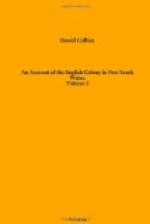The prisoners, in their defence, brought forward a crowd of witnesses to prove that a number of white people had at various times been killed by the natives; but, could these people have been sufficiently understood, proofs would not have been wanting on their side, of the wanton and barbarous manner in which many of them had been destroyed.
Entertaining doubts as to the light in which the natives were to be held, the court applied to the governor for such information as he could furnish upon this subject; and he accordingly sent them the orders which from time to time had been given respecting these people, and a copy of an article in his Majesty’s instructions to the governor, which in strong and express terms places them under the protection of the British government, and directs, that if any of its subjects should wantonly destroy them, or give them unnecessary interruption in the exercise of their several occupations, they were to be brought to punishment according to the degree and nature of their offence.
In this instance, however, the court were divided in their sentiments respecting the nature of the offence, and submitted the whole business, with their doubts, to his Majesty’s minister. As they could not see their way distinctly, they certainly were right to apply for assistance; but, as it was impossible to explain to the natives, or cause them to comprehend the nature of these doubts, it was to be expected that they would ill brook the return of the prisoners to their farms and occupations, without having received some punishment: a circumstance wholly inconsistent with their own ideas and customs; and, indeed, they loudly threatened to burn the crops as soon as it could be effected.* Fire, in the hands of a body of irritated and hostile natives, might, with but little trouble to them, ruin the prospect of an abundant harvest; and it appeared by this threat, that they were not ignorant of having this power in their hands; it was, therefore, certainly very essential to the comfort and security of the settlers in particular, that they should live with them upon amicable terms.
[* Fortunately, though greatly incensed, they did not put this threat in execution.]
Towards the latter end of the month, the Walker whaler came in from sea, not having met with any success, though cruising in the height of the summer season. She had spoke the Albion, which, though out a longer time, had been equally unsuccessful.
The public gaol at Sydney still wanting much of its completion, from the insufficiency of the sums which had been raised to carry it on; and it appearing that most of the officers had already paid to the amount of forty pounds each as an individual share of the expense, it became indispensably requisite that some means should be immediately adopted to finish the building; and, as the price of wheat had, at the urgent and repeated solicitation of the settlers, been for this season continued at ten shillings per bushel, it was proposed to raise a sum for this purpose, by each person leaving in the hands of the commissary sixpence for every bushel of wheat they should put into the store. This contribution would be the least felt, and was to cease so soon as a sum sufficient for the purpose was collected.




